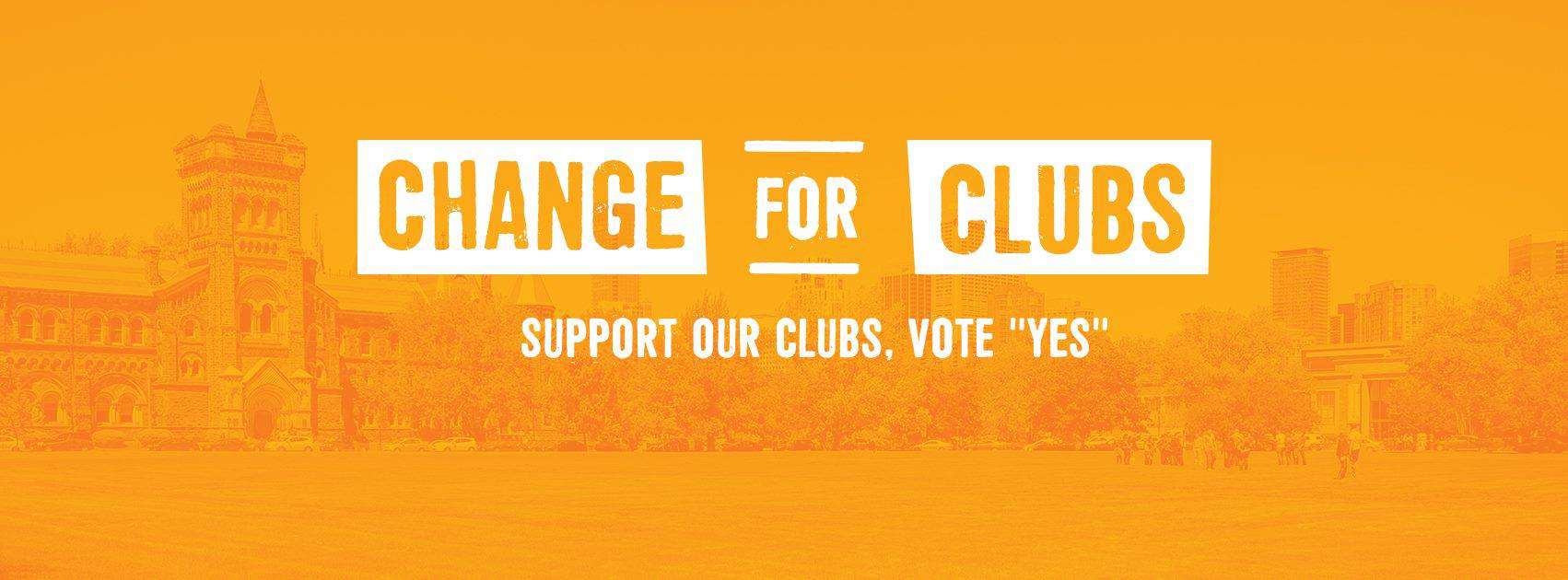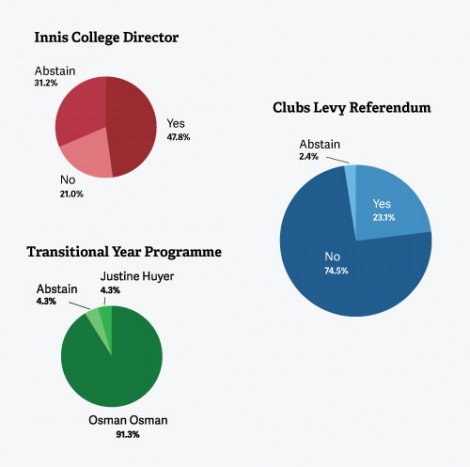The University of Toronto Students’ Union’s (UTSU) proposal for a new levy to fund student clubs has failed, with 74.5 per cent of referendum voters casting their ballots against the fee.
The referendum was held from October 18–20. Of the 2,026 students that voted, 23.1 per cent voted in favour of the proposed levy and 2.4 per cent abstained.
The proposed levy would have been $3.75 per session for the next five years. The funds collected would have been restricted towards clubs, events, and student service funding only, with no amount going towards salaries.
By-elections for vacant director positions also occurred in conjunction with the referendum. Amal Ismail-Ladak ran unopposed and was elected as the Innis College Director, while Osman Osman won against Justine Huyer to become the Transitional Year Programme Director. No candidates ran for OISE Director and Mathematical & Physical Sciences Director.
In an email to The Varsity, Mathias Memmel Vice-President Internal & Services of the UTSU addressed the results of the levy referendum. “I’m obviously disappointed,” he said, “but I understand why students aren’t yet ready to trust the UTSU with money — there’s been gross mismanagement for years.”
Some students launched a Facebook page and put up posters encouraging UTSU members to vote against the levy increase. The Chief Returning Officer ruled that this campaign was against the rules; the UTSU Charter for Referenda require such campaigns register with the Chair of the Elections & Referenda Committee and the CRO as an official advocating committee.
When asked how he would respond to students who did not trust the union, Memmel responded, “We’re going to keep reforming the organization, and that will include taking action to ensure that we’re spending students’ money properly.”
Despite the clubs fee’s failure to pass, Memmel was optimistic about UTSU’s ability to regain students’ trust. “The silver lining is that I and the UTSU can learn a lot from what happened here.”
“I also want to express my sincere gratitude to the clubs — they’ve been great, and I share their disappointment,” Memmel said.
In a previous interview with The Varsity, Memmel stated that funding for clubs in the union’s budget for 2016–2017 increased by $15,000, but most of the new funds would go towards supporting newer clubs. The proposed levy that failed in the referendum was intended to support all clubs, while also funding a potential increase in the funding cap for level three clubs from $15,000 to $20,000.
The referendum is also noteworthy for being the first UTSU referendum to be held entirely electronically. The Varsity spoke with Ryan Gomes, UTSU’s Elections and Referenda Committee Chair about the move to entirely online voting. “I do feel that this transition was a success,” Gomes said.
When asked about the polling stations at Kelly Library and the Athletic Centre, which were respectively cancelled and given reduced hours, Gomes replied that UTSU faced difficulties in finding students to operate these stations.
He went on to say, “Student workers, as well as associates, were utilized to keep these polling stations running for as long as possible,” while other stations were open for the duration of the referendum.
On the referendum results, Gomes said, “I think the students have spoken clearly, and the UTSU must respect their members when they vote against new proposed fees.”
Gomes highlighted the high voter turnout as a positive sign, regardless of the outcome of the referendum, as “the referendum received a lot of student engagement, which is always good.”
“I hope that those who wish to run future fee campaigns keep this year’s vote in mind moving forward,” said Gomes.



